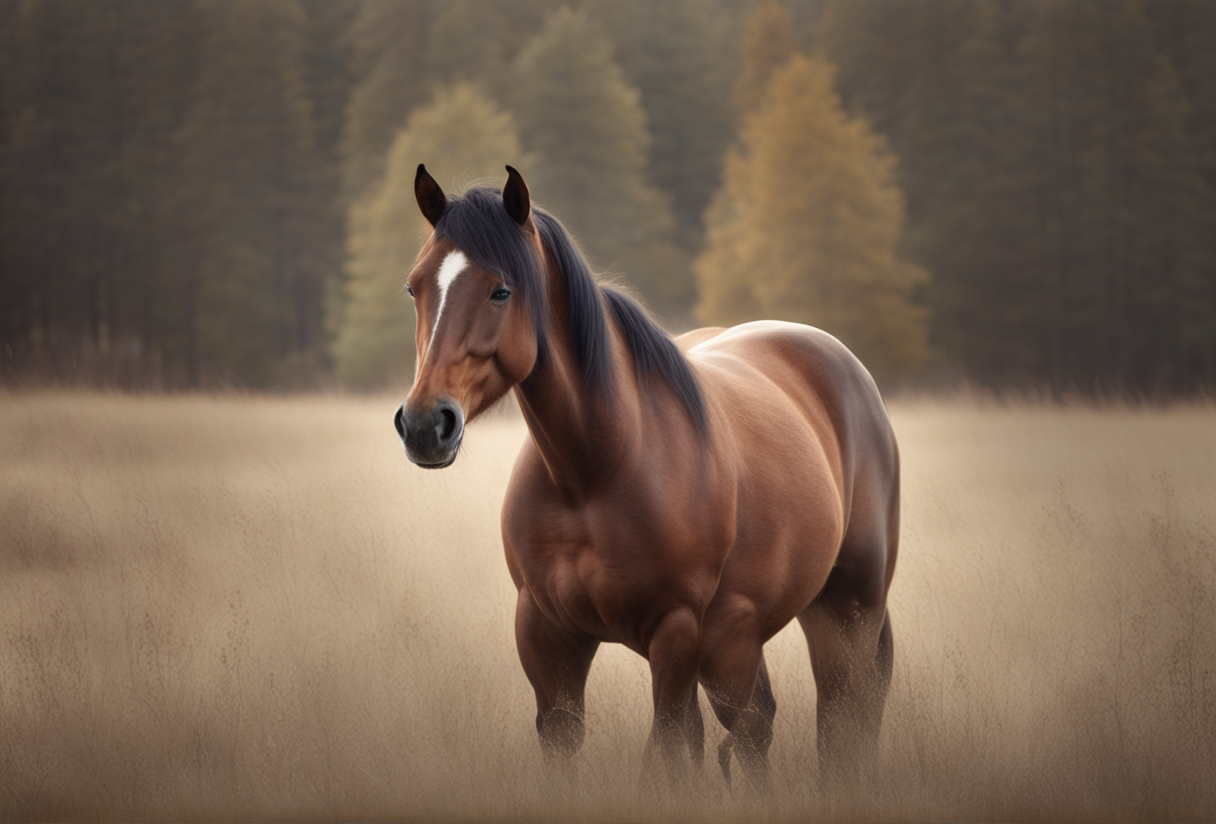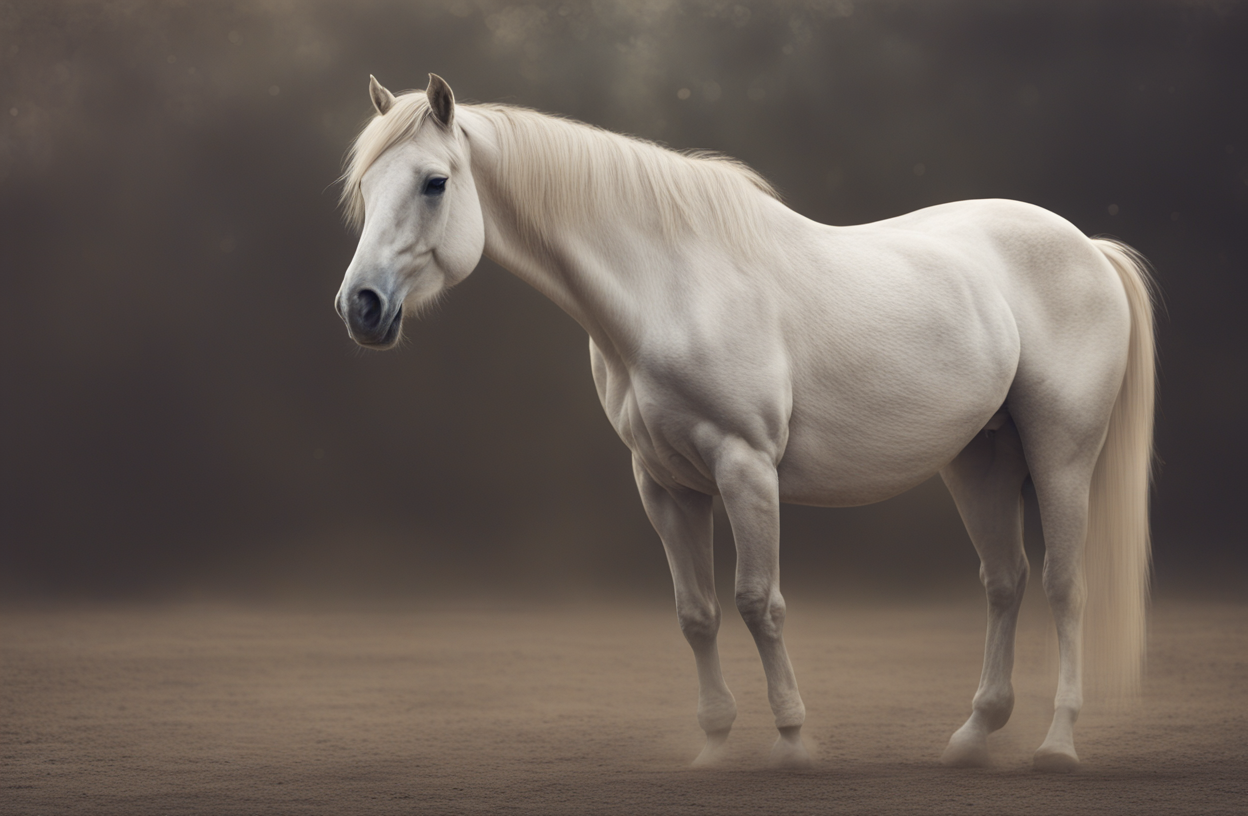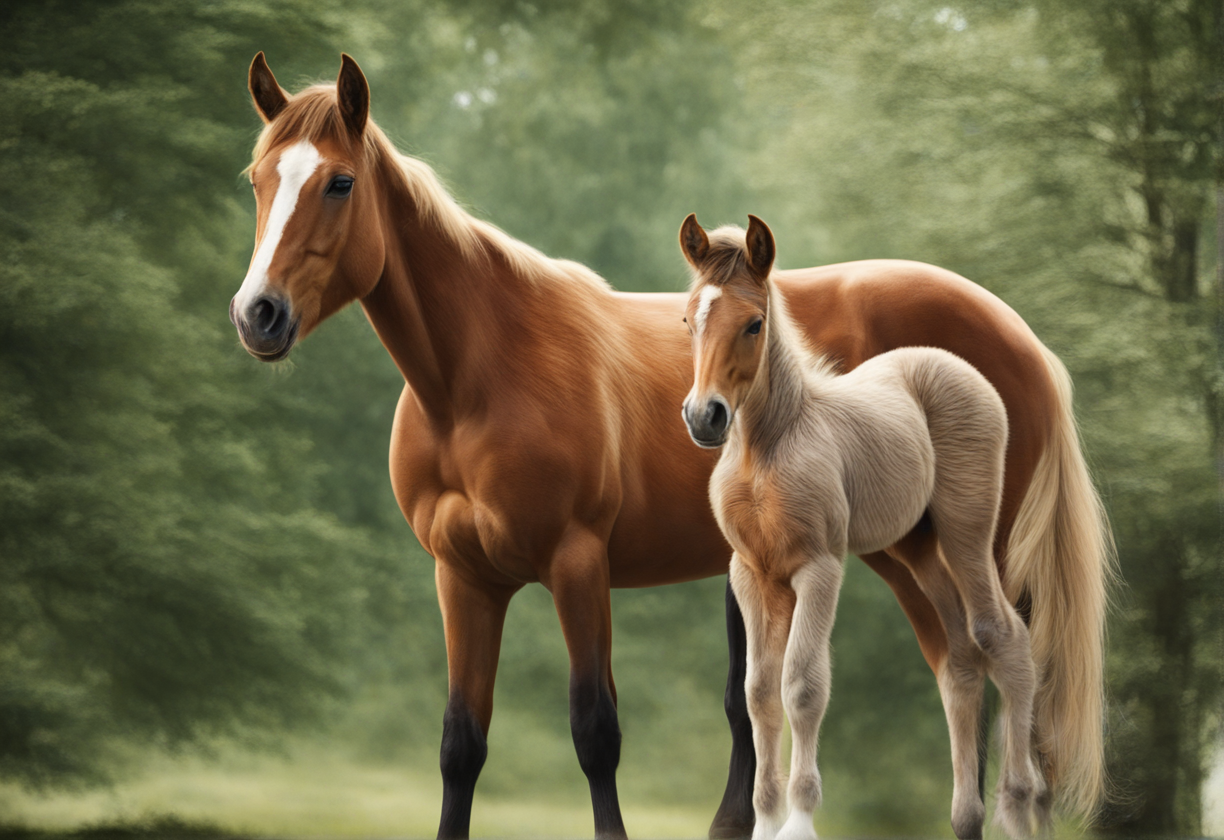As I was out feeding the horses on my ranch last weekend, I noticed my pal Willow wasn’t looking too hot.
She was off in a corner by herself just staring off into space instead of chowin’ down on hay with the other gals.
Being the concerned pony papa that I am, I went over to check on her.
Whaddya know – Willow had miscarried her little one!
Now I know mares can abort their babies for good reasons, but I wanted to find out for sure what happened.
So I did some digging to learn the real skinny on why horses end their pregnancies.
Table of Contents
Stress Can Really Freak Out a Mare
When horses get all worked up and anxious, it can cause them to lose their little ones. See, a mare knows deep down that bringing a foal into an unsafe place just ain’t smart.

If there’s too much loud noises like trucks, strange smells from other animals, or other horses bullying her, it can induce a pile of stress during her pregnancy.
Being anxious is kind of like how we people get when we’ve got a big test coming up or an important work deadline – our bodies go all fight or flight. For horses, all that stress can signal to their bodies that it’s better to end the pregnancy rather than try dealing with it all while carrying a baby.
Even more normal things like moving barns, changing feeding schedules, or introducing a new horse can put too much pressure on a mare. And don’t even get me started on fireworks or thunderstorms – those loud pops and booms will have a mare absolutely panicked! All it takes is a day or two of high anxiety for her body to decide terminating the pregnancy is the safer choice.
Stress hormones like cortisol flood a mare’s system when she’s feeling worried or scared. In large amounts, they can interfere with how her uterus functions and signals to her pituitary gland that the time isn’t right to maintain a healthy pregnancy. So even little things we don’t think about can really get under a mare’s skin and lead to a miscarriage if it’s not addressed.
Making sure mares have a low-stress environment with consistency and comforts like same-barn friends is key to avoiding abortions from anxiety. Give yours extra lovin’ if she seems jittery to help balance out those stress chemicals flowing through her.
Say Bye Bye to a Sickly Filly
If a mare catches an infection or disease while she’s expecting, her body may see the developing foal as a threat and expel it. Common culprits are Equine Herpes Virus, Equine Influenza, or bacterial issues like Streptococcus equi or Salmonella. Yuck!

These germs can really sicken a horse mama and disrupt her immune system from focusing on a healthy pregnancy. It’s like how when we get a cold or the flu, we feel too crummy to take care of others. A mare’s body is the same way – if she’s fighting off illness, she can’t properly nourish and nurture a baby growing inside her.
Mares are also at risk for parasites like ascarids that latch onto the placenta or mare’s vital organs. Sometimes fungal infections from moldy hay like Sweet Itch can cause irritation along with the issues mentioned. Bacteria and other critters living in her reproductive tract are also possible instigators of abortions.
When a mare’s immune system kicks into high gear because of infection, it may decide the safest choice is removing the fetus. That way she can focus all her energy on getting healthy again without worrying about supporting extra life. In a way, it’s like how humans develop fevers to fight infection – an abortion is part of a mare’s natural immune defenses in action too.
Catch infections and issues early with regular vet exams and appropriate deworming/vaccination schedules. That way if a mare does fall ill, her pregnancy isn’t automatically at risk due to a compromised ability to fight it off internally.
Feed a Mare Properly and Save That Foal
Pregnant mares have serious calorie, protein, vitamin and mineral demands to support growing a healthy baby inside them.

Each day she needs tons of high-quality fiber from grass or hay, balanced grain rations, and nutritional supplements. All those nutrients are crucial building blocks for a developing foal.
If a mare isn’t gaining the proper pounds or isn’t energized, it shows she isn’t getting enough good chow to do her maternal duties. We all know what happens when humans don’t eat well during pregnancies – it stresses our bodies and can threaten the baby. Same goes for horses!
Feeding a mare less than what’s recommended based on her body size, age and stage of gestation puts unnecessary strain on her system. It drains her energy reserves that should be going to uterus growth, milk production, and nurturing fetal development. Her body may sense this shortage as a warning sign to terminate the pregnancy before problems arise later on.
So be ultra-vigilant about pasture or hay quality/quantity, commercial feed amounts, and adding a mare/foal supplement. Work with your vet and feed expert to create an ideal balanced diet plan keeping a mare and her nutrients top of mind. After all, you want to give your horse baby the best shot at being born hale and hearty!
Pregnancy Issues Can Send Filly Packing
Complications during gestation are another trigger for forced miscarriages. Carrying multiples like twins puts extra pressure on a mare’s uterus and placenta. Twins rarely both survive to term and nature may end one pregnancy for the health of the other.
Problems like the super rare torsion of the uterus where it twists the wrong way or an infection of the amniotic fluid can disrupt baby’s oxygen supply. Placental abnormalities stopping nutrients from transferring properly will signal a mare to eject her passenger before severe harm comes to either.
Genetic defects are sad causes too if they’re not caught in time. Issues like dwarfism, cerebellar hypoplasia damaging the brain, or cardio or musculoskeletal anomalies endanger both mare and foal’s wellbeing down the line. You gotta do what’s right for mom even if it means losing the potential of an individual foal.
Old scars from C-sections or uterine tears may create weak spots unable to maintain gestation longterm either. Nature knows when problems exist and takes corrective action through miscarriage to avoid greater losses later. It’s not foolproof but shows how sophisticated a mare’s instinct truly is.
Your vet can feel for issues early on and monitor mares at risk. But unless a viable healthy pregnancy is indicated, it’s best to trust your mare’s internal wisdom over human interference with her maternal choices.
Well there you have the real lowdown on why your pony pal might flush her foal. Pretty enlightening how their systems deal with pregnancy glitches naturally, huh? Let me know if you need any other mare or foaling questions answered!
Hormonal Imbalances Happen
Just like people, mares’ reproductive cycles rely on a delicate estrogen-progesterone balance.
Stresses can disrupt this interplay leading to early fetoplacental apoptosis signaling miscarriage.
Some mares’ placentas don’t synthesize enough progesterone to maintain pregnancy.
Low progesterone suppresses immune tolerance letting the body reject the fetus.
Prolactin fluctuations around birth can induce abortions if levels drop too soon.
Cortisol spikes from inflammation diminish progesterone’s tissue-protecting effects.
Addressing underlying causes may remedy hormonal-driven early pregnancy losses.
Age Ain’t Just a Number for Mares
Very young or older mares have a higher incidence of fetal loss in early gestation.
Their reproductive tracts may not be fully matured to nurture a developing embryo.
As mares age past 20, uterine scarring and decreased blood flow impact implantation.
First-time mothers are still learning what it takes to maintain a healthy pregnancy term.
Seniors’ hormone regulation declines and pelvises stiffen making foaling riskier.
Monitor high-risk mares carefully with regular ultrasounds and adjusted management.
Good nutrition optimizes reproductive success rates regardless of mare’s age.
Traumatic Injuries Affect Baby-Making
Physical damage like kicks during pasture disputes endangers a mare’s pregnancy.
Fall injuries, car accidents or other traumas cause bruising of the uterus and placenta.
Ruptured blood vessels reduce oxygen and create risks of infection transmission.
Internal bleeding places the mother’s health over continuing an unpredictable gestation.
Bone fractures especially of the pelvis alter posture and mobility needed for late-stage carrying.
Proper fencing, herd dynamics monitoring, and timely veterinary response limit injury risks.
Patience heals mares to rebreed at full constitution rather than endangering current fetus.
Body Condition Counts Big Time
Being too fat or too thin jeopardizes a mare carrying a foal to term successfully.
Obesity strains hearts and vital organs transferring nutrients leaving less for fetal support.
Emaciation shows nutritional privation depleting maternal stores and immune competency.
Large acute weight losses from sickness or dentinal issues sabotage necessary calories.
Target a Body Condition Score of 5-7 out of 9 via pasture management and feeding programs.
Regular weight evaluations identify mares needing intervening care before fetal threats emerge.
Healthy weight maintains reproductive hormones while preparing physically for foaling.
Behavioral Breeding Blunders
Multiple breedings in quick succession over-stress mares without recovery periods.
Erratic ovarian cycles from inconsistent light exposure disrupt hormonal orchestration.
Human-controlled artificial insemination mishaps like cervical trauma induce abortions.
Aggressive stallion behavior frightens mares often terminating early embryonic development.
Poor facility hygiene spreads disease and infections compromising ability to carry young.
Natural pasture breeding when mares show behavioral estrus signs minimizes such risks.
Patience with the breeding process respects mares’ biological rhythms and capacities.
Toxic Plants Poison Pregnancies
Certain weeds, shrubs and mushrooms contain potent abortifacient properties.
Yew, lupines, locoweed, jimson, Death Camus endanger gravid mares in compromised pastures.
These invade fields when grass is inadequate pressuring hungry pregnant equines to eat them.
Proper forage management and rotational grazing prevents toxic exposures.
Identify dangerous species to promptly remove before mares can consume abortifacient amounts.
Some supplements and medications like Too-Many-Vitamins Disease also induce miscarriages.
Cautious ingredient sourcing protects placental function and fetal neurological development.
Travel Terrains Threaten Health
Rough, rocky terrain puts strain on mares’ joints and ligaments risking strain injuries.
Slippery, muddy conditions increase falls endangering maternal health and pregnancy viability.
Trailering stresses equines with jostling, confined spaces and unfamiliarity.
Long hauls without food, water or rest breaks impact hydration and fetal well-being.
Plan transportation avoiding late gestation or minimize trauma with padding, breaks and rest.
Steep properties demand careful, considered mare management preserving comfort and mobility.
Terrain challenges warrant extra mare healthcare, body condition monitoring and routine vetting.